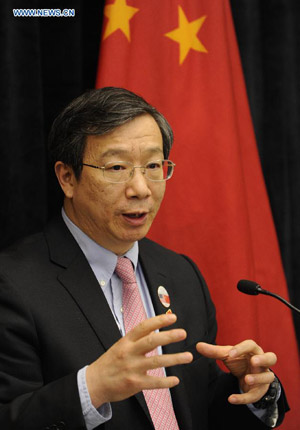
 |
| Yi Gang, deputy governor of the People's Bank of China, the country's central bank, attends a press briefing during the ongoing fifth round of the China-U.S. Strategic and Economic Dialogue (S&ED) in Washington, July 11, 2013. Yi Gang said here on Thursday that the two-way fluctuation expectation of Renminbi (RMB) exchange rate indicated that the Chinese currency had become more market-oriented. (Xinhua/Fang Zhe) |
WASHINGTON, July 11 (Xinhua) -- The two-way fluctuation expectation of Renminbi (RMB) exchange rate indicated that the Chinese currency had become more market-oriented, a senior Chinese central bank official said here on Thursday.
"There are two-way fluctuation expectations of RMB exchange rate in the recent spot and forward exchange rate markets," Yi Gang, deputy governor of the People's Bank of China, told a press briefing at the fifth round of the China-U.S. Strategic and Economic Dialogue (S&ED).
This new trend indicated that the Chinese currency became more market-oriented as there had been a unilateral appreciation expectation of its exchange rate for a long time, he added.
Yi told reporters that the value of RMB against U.S. dollar had nominally appreciated by 2 percent since the beginning of this year, and the RMB real effective exchange rate (REER) had increased by about 6 percent at the same period, highlighting a substantial progress toward the market-oriented currency exchange rate reform.
The central bank official stressed that China would continue to promote the RMB exchange rate reform and make progress in the capital account convertibility.
As a very important feature of such reform, the supply-and-demand relation in the market will play a more important role in deciding the exchange rate of RMB, he added.
Yi also said that China was fully prepared to tackle the challenge, such as capital outflows, amid prospects of U.S. Federal Reserve's withdrawal of quantitative easing later this year.
He noted that China had abundant liquidity buffer with a high reserve requirement ratio, and would maintain prudent monetary policy to provide appropriate liquidity for Chinese money markets.
U.S. Federal Reserve Chairman Ben Bernanke said last month the central bank could start scaling back its 85-billion-U.S. dollar monthly bond purchasing program later this year, if the economy continued to progress as the Fed expected.
The tapering plan has caused investors to withdraw money from emerging markets and restructure their portfolios, stoking volatility in currency, bond and equity markets around the globe.
















 China's Chongqing issues orange-coded alert of heat
China's Chongqing issues orange-coded alert of heat


![]()
